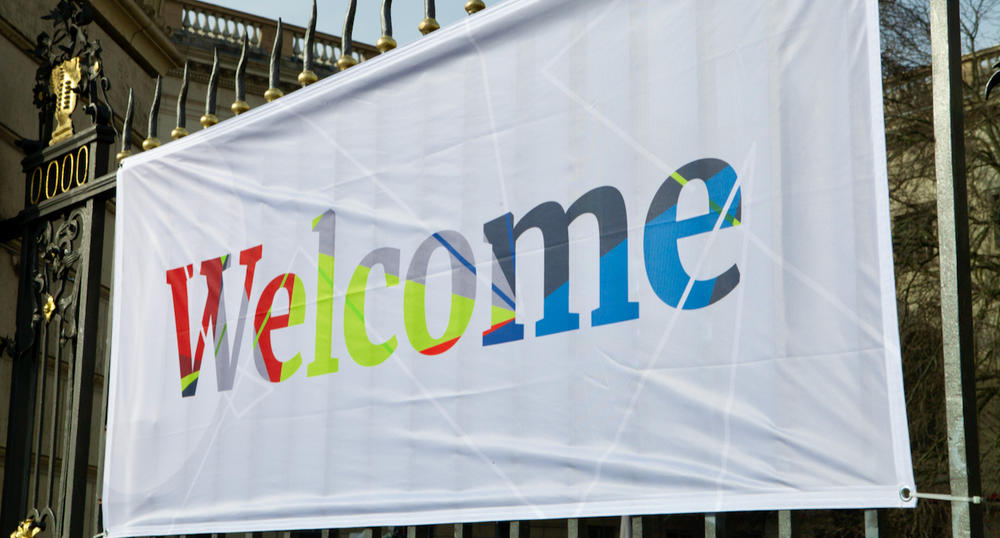Nadin Gaasch
Program Manager for Research Forums in Objective 2: Fostering Knowledge Exchange
Sep 07, 2020
One pillar of the Berlin University Alliance's knowledge exchange strategy is the exchange across institutional boundaries and with stakeholders from politics, culture, economy, and society. In so-called research forums, this multidirectional exchange of knowledge is to be reinforced and solutions for pressing questions of our time are to be discussed and developed. Since July 2020, Nadin Gaasch has been Program Manager for Research Forums in Objective 2: Fostering Knowledge Exchange. She previously worked as a program manager for science management at the Potsdam Institute for Climate Impact Research (PIK) e.V.
Nadin, you are a program manager for research forums. What can we imagine under this format?
Science integrates non-scientific expertise – that is the core idea of the research forums. A research forum is a multi-year process through which we answer and develop research questions in the area of the Grand Challenges – the major societal challenges of our time – and at the same time develop practical solutions for global objectives such as those of social cohesion or global health. “We” means researchers together with stakeholders from politics, culture, economy, and civil society.
Due to their transdisciplinary approach, the research forums are ideally suited to developing new ideas and leaving behind well-trodden paths of one-sided knowledge transfer. Transdisciplinarity means not remaining thematically and methodologically confined to a single academic discipline or to the academic world, but formulating and working on research questions from multiple perspectives in critical reflection with partners not affiliated with academia. The core element of such a process is the integration of knowledge at eye level, especially in the joint description of the problem and participation in the research process as a research principle – in addition to disciplinary and interdisciplinary research.
The research forums thus create new perspectives for science and practical approaches to solving social problems – for Berlin and beyond.
Why is dialogue with politics, economy, culture, and society so important for science?
There is often a discrepancy between knowledge and action. We know, for example, that global warming must not exceed the two-degree mark by 2100; we also basically know what we must do to achieve this. Nevertheless, individual, societal, political, and economic behaviors mean that this sustainability goal will most likely not be achieved. Why is that? That is because each of us has their own treasure trove of knowledge and pursues their own ideas and interests. Thus, science is only one player among many when it comes to shaping our future in a sustainable manner. We need the knowledge of as many stakeholders as possible to develop robust solutions to the major challenges facing our world. In the final analysis, we can only succeed together.
On what topic are you planning the next research forum?
With the research forums, we support in particular the Grand Challenge Initiatives of the Berlin University Alliance. Two global challenges have already been identified as thematic priorities: Social Cohesion and Global Health. For both topics, we are currently planning accompanying transdisciplinary processes – this in close cooperation with our colleagues from Objective 1. Ultimately, the search for the "Berlin approach" underlies both thematic priorities: What relevance do the topics have in Berlin society and in the Berlin research landscape, and what specific contribution to the development of sustainable solutions can Berlin make socially, politically, economically, culturally, and scientifically? In the medium term, we aim to further develop the methods and formats used to bring topics from society into science and thus try out new roles for all participants.
Even during the application phase for the excellence alliance, we organized a research forum on the topic of “New Health: Ethical challenges posed by digitalization“. The results of the project evaluation confirm not only the great interest, but also the need to approach sociopolitical issues and processes in a transdisciplinary manner and to solve them together. In addition to top-level scientists, representatives of health-related associations, companies and political sectors discussed the ethical challenges and opportunities associated with digitalization in the healthcare sector at this research forum. The topic of artificial intelligence (AI) in diagnostics was then developed further as the follow-up project KIRA (derived from the German “Künstliche Intelligenz in der Radiologie” (Artificial intelligence in radiology)). A transdisciplinary consultation of stakeholders and interested parties was used to jointly develop recommendations for the further development of AI in radiology.
Why is the Berlin University Alliance particularly well suited for this multi-institutional and cross-disciplinary exchange?
The numbers speak for themselves: With almost 1,700 professors and more than 580 study programs, Berlin's three major universities and Charité offer a broad range of expertise – ideal conditions for further thinking about the multidirectional exchange of knowledge and for developing new procedures. The excellence strategy now allows additional space for experimentation and creative ideas. However, we still must tinker a bit with the necessary structures for joint thinking and working.
You joined the Fostering Knowledge Exchange team two months ago. Were there any initial challenges?
Certainly, there were. Getting started in a complex entity like the Berlin University Alliance is always a challenge. But in the end, it's exactly my thing: listening, asking questions, bringing together different interests, and finding solutions. In our still small team, I sense a lot of drive to really get going now – which doesn't surprise me, but motivates me a lot.

